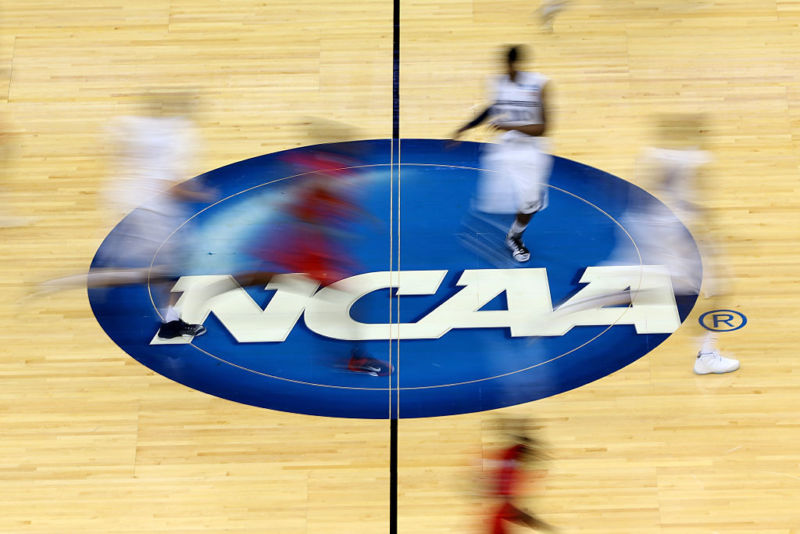
California Governor Gavin Newsom today signed a bill into law allowing college athletes to get paid for endorsements, setting up a battle between the state government and the NCAA.
The NCAA strongly opposes California’s Fair Play to Pay Act and has threatened to sue the state and prohibit California colleges from competing in NCAA events, even though the new law doesn’t actually require colleges to pay athletes. Instead, the act allows student athletes to hire agents and get paid by third parties for sports-related endorsements.
“Colleges and universities reap billions from these student athletes’ sacrifices and success but block them from earning a single dollar. That’s a bankrupt model,” Newsom said in his announcement of the bill signing. When it takes effect in 2023, the new law will make California “the first state in the nation to allow student athletes to receive compensation from the use of their name, image, and likeness,” the announcement said.
Here’s how the bill achieves that goal, as explained in Newsom’s press release:
Starting on January 1, 2023, the Fair Pay to Play Act will allow all student athletes enrolled in public and private four-year colleges and universities in California to earn money from their name, image, or likeness. Student athletes will also be able to hire sports agents and not lose their scholarships if they receive income for their work. Further, SB 206 prohibits California colleges from enforcing NCAA rules that prevent student athletes from earning compensation and will prevent the NCAA from banning California universities from intercollegiate sports if their athletes sign sponsorship deals.
NCAA continues opposition
The bill was inspired partly by former UCLA basketball star Ed O’Bannon’s lawsuit against the NCAA over the use of athletes’ images in video games and other types of media. O’Bannon became the lead plaintiff in the antitrust class action after his likeness was used in the Electronic Arts game NCAA Basketball 09. O’Bannon’s side achieved a partial victory in the case against the NCAA, and players obtained a $60 million settlement from Electronic Arts, which reportedly amounted to an average of $1,600 per player.
The case ultimately didn’t have much impact on actual NCAA policies, and it helped prevent production of more college sports games. “The lawsuit filed against Electronic Arts and the NCAA resulted in the discontinuation of the college video game franchise,” ESPN wrote at the time of the settlement. “NCAA Football 14, which hit shelves in July 2013, was the last game that was produced.” The similar NCAA basketball series of video games was discontinued after the 2010 edition.
Theoretically, the California law could pave the way for officially licensed NCAA sports video games that benefit schools and players financially. But that isn’t likely to happen as long as the NCAA continues to oppose payments to athletes in any form.
The NCAA urged Gov. Newsom to reject the bill in a letter that threatened to bar California universities from NCAA competitions. The NCAA said the California bill “would erase the critical distinction between college and professional athletics and, because it gives those schools an unfair recruiting advantage, would result in them eventually being unable to compete in NCAA competitions.”
Of course, the NCAA could eliminate what it called California’s “unfair recruiting advantage” by changing its rules to let student athletes in all states earn endorsements. The NCAA’s amateurism rules say that student athletes may not “promote or endorse a product or allow their name, image, or likeness to be used for commercial or promotional purposes.” Violating the rule would prevent athletes from getting the “amateurism certification” they need to compete in NCAA sports.
The NCAA letter called the California bill “unconstitutional,” suggesting that the organization might sue the state to prevent its implementation. The NCAA also said it’s working to change its rules but did not commit to actually letting athletes get any money.
“NCAA member schools already are working on changing rules for all student athletes to appropriately use their name, image, and likeness in accordance with our values—but not pay them to play,” the NCAA said.
The NCAA issued another statement today after Newsom signed the bill. The NCAA said that it “will consider next steps in California while our members move forward with ongoing efforts to make adjustments to NCAA name, image, and likeness rules that are both realistic in modern society and tied to higher education.” The new NCAA statement also claimed that the new law is “creating confusion for current and future student athletes, coaches, administrators, and campuses.”
Thumbs up from athletes
Newsom signed the bill on an episode of HBO’s The Shop: Uninterrupted, appearing alongside LeBron James, O’Bannon, UCLA gymnast Katelyn Ohashi, and WNBA player Diana Taurasi.
“Athletes at every level deserve to be empowered and to be fairly compensated for their work, especially in a system where so many are profiting off of their talents,” James said.
The bill was sponsored in the California Senate by Sens. Nancy Skinner (D-Berkeley) and Senator Steven Bradford (D-Gardena). Skinner said the bill “makes California the first state to restore to student athletes a right everyone else has: the right to earn money from their name, image, and likeness.”
Bradford said the new law addresses an important civil rights issue and that “colleges and universities should no longer treat student athletes as chattel.”
“While our student athletes struggle to get by with basic necessities such as food and clothing, universities and the NCAA make millions off of their talent and labor,” Bradford said. “College coaches are now some of the highest paid employees in the country because of the talented young men and women who play for them.”
Newsom suggested that other states will replicate California’s new law. “This is the beginning of a national movement—one that transcends geographic and partisan lines,” Newsom said.
https://arstechnica.com/?p=1577131

